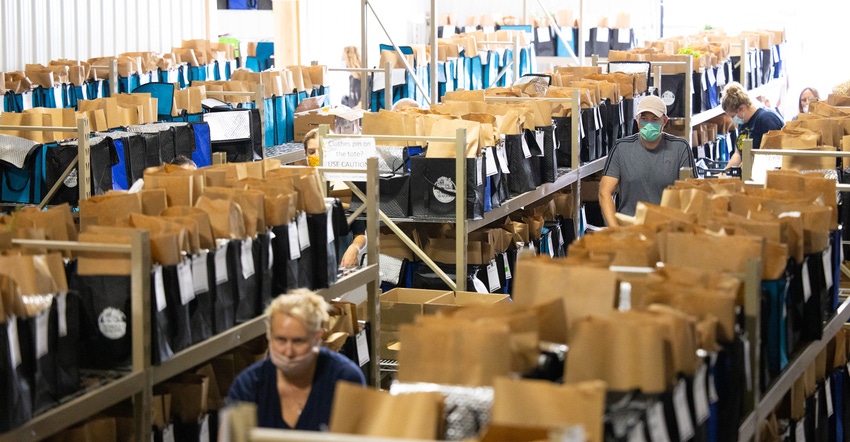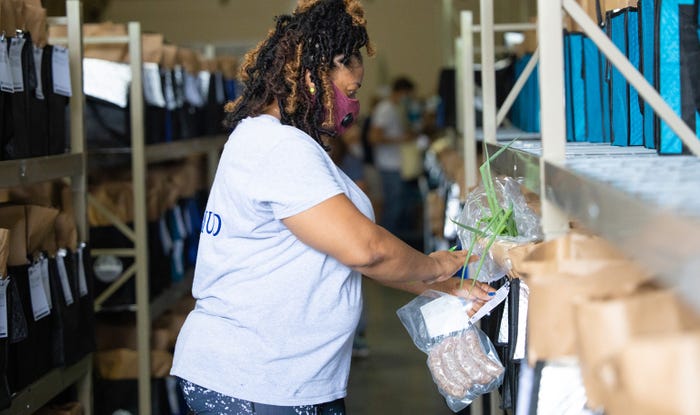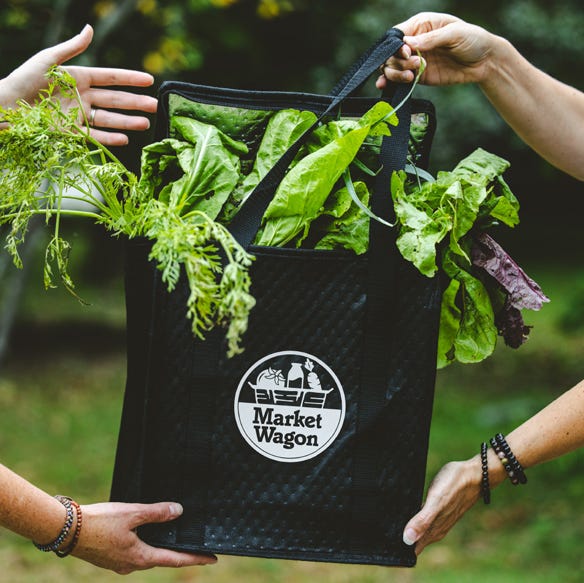
Direct marketing local foods to consumers can be a challenge for many farmers. How much to produce is the main consideration, followed by how much to pack and take to the farmers market in town.
Farmers in Minnesota have a new marketing option to consider. Market Wagon, based in Indiana, recently opened its first food distribution hub in the state in Fridley, and is in the process of adding more growers to its list. Market Wagon focuses on helping farmers get their products to local customers the 21st-century way: Online ordering and home delivery.
"This business is all about giving consumers more ways and easier access to buy local — and giving farmers and food producers more ways to reach them," says Nick Carter, Market Wagon cofounder and CEO. "By bringing the same products you'd expect at a local farmers market into an online shop, we are increasing the market for local farms and artisans, and ultimately it's those vendors that win."
 FILLING CUSTOMER TOTES: Fresh foods and other products are packed weekly at Market Wagon hubs.
FILLING CUSTOMER TOTES: Fresh foods and other products are packed weekly at Market Wagon hubs.

Carter, a fourth-generation farmer, returned to his roots after working off the farm in the software technology industry. Growing up, his family farm near Russiaville, Ind., evolved from a diversified crop and livestock farm to one that only cash-cropped corn and soybeans. By then, he did not have any interest in remaining on the farm. A decade later, however, circumstances evolved. Now, Carter and his young family are converting the farming operation back to pastured beef, pork and poultry. He also partnered with logistics expert Dan Brunner to start Market Wagon in 2016 in Indianapolis.
Carter says he is committed to helping an industry where 85 cents of every food dollar traditionally spent by consumers goes somewhere other than to farmers and ranchers.
How it works
For its launch in the seven-county metro area, Market Wagon had more than two dozen vendors and 100 customers signed up online, ready to buy. The current delivery area covers Anoka, Carver, Dakota, Hennepin, Ramsay, Scott and Washington counties.
The service works this way. Customers browse lists of local products on their computer or smartphone throughout the week, and then place an order with the listed vendors in a single checkout. Early each week, participating farmers receive lists of products ordered, box them for transport and deliver them to the Fridley distribution hub. Here, farmers systematically pack customers’ reusable insulated totes with their orders. All packing needs to be done by Monday, since delivery takes place on Tuesday. Each route is figured out by Market Wagon software to ensure efficient delivery.
When customers go online to shop, they can either search for the food or vendor by name, or order a preset bundle, such as the meat or market sampler. They also can connect directly with their local farmer to learn more about their products. Metro shoppers have more than 250 local products to choose from, with more farmer-vendors routinely loading new products.

REUSABLE BAGS: To keep costs down, Market Wagon reuses its delivery totes. Customers set them out for pickup on their next delivery day.

“We’re constantly bringing on new vendors,” Carter says. “The opportunity [to market] is huge for farmers, and we encourage them to go online and apply.”
One Minnesota farmer who did so is Amanda Yadav, who grows fresh produce at Fiddlehead Farm in Andover. She wants to help consumers have a deeper connection with those who grow the food on their plates.
“When you come to know and love where your food comes from, you don’t want to eat any other way,” Yadav says. “It’s my hope that Market Wagon can help build a healthier local food community by facilitating access to the foods and products of our local farmers, growers and makers.”
A few other farms that have joined Market Wagon are Prairie Hollow Farm, Elgin, which offers vegetables and cheeses; and Rotational Roots, Cannon Falls, which raises vegetables, such as onions and squash.
About the company
Nationally, Market Wagon is available in more than 35 markets in Alabama, Arkansas, Georgia, Illinois, Indiana, Iowa, Kansas, Kentucky, Maryland, Michigan, Minnesota, Mississippi, Missouri, North Carolina, Ohio, Pennsylvania, South Carolina, Tennessee and Wisconsin. It partners with more than 2,500 local farmers and artisans to take their produce and products to the doorsteps of 45,000-plus local customers.
Online customers can order at any time. There are no upfront fees or long-term subscriptions.
Food is delivered in bags that are picked up during the next delivery. A flat $6.95 delivery fee is charged.
For more information about becoming a vendor, visit bit.ly/mwbeavendor.
Or to buy online, visit bit.ly/mwbuyonline.
About the Author(s)
You May Also Like






